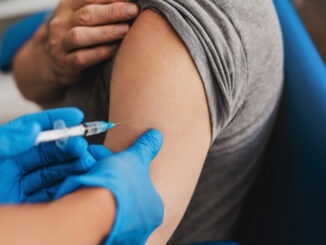
As reported by the BBC, NHS England is to offer hundreds of patients the world’s first cancer drug to target an inherited genetic fault
Cancer experts hailed the decision as “momentous” while healthcare body NICE said it would “improve quality of life”.
The drug olaparib is designed to treat specific cancers linked to faulty versions of genes known as BRCAs.
Some 800 people in total will be eligible for the treatment.
Around 500 men with advanced prostate cancer and 300 women with HER2-negative early breast cancer who are at high risk of the disease returning will be able to access olaparib free on the NHS immediately.
‘Desperate’ for it
Ava Lee, 46, from east London, was diagnosed with breast cancer more than two years ago.
She said cancer had turned her life upside down, but having early access to olaparib following a successful trial had made her feel more positive.
“It’s given me a realistic hope, a realistic chance of a future without cancer – that I can live a long and healthy life without the cancer coming back,” she said.
Lee is now looking forward to spending time with her husband, going travelling together and doing the things they love – like cycling and running.
After her surgery and radiotherapy, she felt scared about the cancer returning.
“To know there was a drug out there that could reduce the chance of recurrence and potentially stop it ever coming back… I was absolutely desperate to get it.”
She said she would treasure every day with family and friends from now on.
How does olaparib work?
Olaparib works by blocking an enzyme that helps cells repair damaged DNA, thereby preventing cancer cells from growing and spreading while leaving healthy cells intact.
Andrew Tutt, professor of breast oncology at the Institute of Cancer Research and King’s College London, carried out early lab work on olaparib and said the move to recommend it for use by the NHS was “exciting”.
The medicine helps patients with breast cancer due to inherited gene faults (BRCA1 or BRCA2 are the most common), which can be tested for quite easily.
Around five per cent of women with breast cancer carry these altered genes – actress Angelina Jolie is probably the most well-known of those affected.
It then targets that particular weakness and improves someone’s chances of surviving breast cancer or extends their life with prostate cancer in a way that has not been possible before, Prof Tutt said.
“For example, it means that for a woman who has been diagnosed with breast cancer and told she needs chemotherapy to improve survival, she can now have a year of tablet treatments that will further improve her chances of surviving breast cancer by about a third,” he added.
‘Stop people dying’
NICE, the National Institute for Health and Care Excellence, said a deal had been struck between NHS England and manufacturer AstraZeneca to allow the drug to be offered to:
- adults with HER2-negative, high-risk early breast cancer who have inherited faults in their BRCA1 or BRCA2 genes, after surgery and chemotherapy
- people with previously treated hormone-relapsed metastatic prostate cancer who have the same BRCA mutations
Olaparib has already been available on the NHS in England and Wales for women with advanced ovarian cancer, caused by the same faulty genes.
In Scotland, it has been offered free to the same groups of patients, and also to some men with advanced inherited prostate cancer, since 2021.
Baroness Delyth Morgan, chief executive at charity Breast Cancer Now, said: “Olaparib can reduce the risk of people’s cancer returning or progressing to incurable secondary breast cancer and stop people dying from this devastating disease.”
There are 55,000 new cases of breast cancer in the UK each year, and the disease kills 1,500 women annually.
Prostate cancer is the most common cancer in men, with 52,000 new diagnoses and 12,000 deaths each year.
The Prostate Cancer UK charity said the first targeted treatments “finally move us away from the old ‘one size fits all’ approach to prostate cancer treatment”.
In trials, 82.7% of people having olaparib after chemotherapy and surgery were alive and free of breast cancer after four years, compared with 75.4% with a dummy drug.
Trials in patients with advanced prostate cancer showed the drug could increase how long people lived if given instead of, or in addition to, current standard treatments.



Be the first to comment